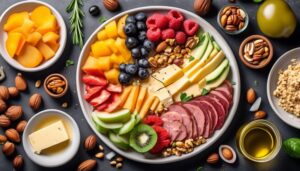In this article, we explore the ultimate superfoods for optimal health. These nutrient-dense foods, including fruits, eggs, lean meats, nuts and seeds, vegetables, fish and seafood, offer a wide range of essential vitamins, minerals, fiber, antioxidants, and healthy fats.
Incorporating these superfoods into your daily routine can greatly enhance your nutritional intake and contribute to overall well-being. Discover the versatility and ease of incorporating these foods into your diet, whether as a main component of a meal or a convenient snack option.
Fruits
What are the key benefits of incorporating fruits into a healthy diet?
Fruits are an essential component of a healthy diet due to their numerous benefits. They are packed with fiber, vitamins, antioxidants, and other essential nutrients that promote overall well-being.
The high fiber content in fruits helps to regulate digestion and prevent constipation.
Vitamins found in fruits, such as vitamin C, contribute to a healthy immune system and promote collagen production for healthy skin.
Antioxidants found in fruits help to protect against cellular damage and reduce the risk of chronic diseases such as heart disease and certain types of cancer.
Additionally, fruits are low in calories and high in water content, making them an excellent choice for weight management.
Eggs
Eggs are a versatile and nutritious superfood that can be incorporated into a healthy diet. They have been a staple in human diets for centuries and are now recognized for their numerous health benefits.
Here are two key reasons why eggs are considered a superfood:
- Nutritional powerhouse:
- Eggs are an excellent source of high-quality protein, containing all the essential amino acids needed for optimal health.
- They are rich in essential vitamins and minerals, including vitamin B12, vitamin D, selenium, and choline, which is crucial for brain health.
- Cholesterol misconception debunked:
- Contrary to previous beliefs, eggs are no longer demonized for their cholesterol content. Current research indicates that dietary cholesterol has minimal impact on blood cholesterol levels for most people.
- Eggs actually raise the levels of ‘good’ HDL cholesterol, which is beneficial for cardiovascular health.
Incorporating eggs into your diet can provide you with essential nutrients and contribute to overall well-being.
Lean Meats
Beef, chicken breasts, lamb, and mutton are lean meats that are known for their excellent sources of protein and other essential nutrients. These meats are low in fat, making them a healthy choice for those looking to maintain or lose weight. They are also rich in vitamins and minerals, such as iron, zinc, and B vitamins.
Protein is essential for building and repairing tissues, supporting immune function, and promoting overall health. Lean meats can be incorporated into a balanced diet to provide the necessary nutrients for optimal health.
It is important to choose lean cuts of meat and prepare them in a healthy way, such as grilling, baking, or broiling, to minimize added fats and maintain their nutritional value.
Nuts and Seeds
Nuts and seeds are a great addition to any healthy diet, providing a wide range of nutrients and health benefits. They are high in healthy fats, fiber, vitamins, and minerals. Here are two sub-lists of nuts and seeds that are particularly beneficial for optimal health:
- Almonds: These nuts are packed with vitamin E, magnesium, and antioxidants, which help reduce inflammation and support heart health.
- Chia seeds: These tiny seeds are an excellent source of omega-3 fatty acids, fiber, and antioxidants, promoting digestion and reducing the risk of chronic diseases.
Coconuts: The meat, milk, and oil derived from coconuts are rich in medium-chain triglycerides (MCTs), which can boost metabolism and provide a quick source of energy.
- Walnuts: Walnuts are high in omega-3 fatty acids and antioxidants, supporting brain health and reducing the risk of heart disease.
Including a variety of nuts and seeds in your diet can contribute to overall well-being and improve various aspects of health.
Vegetables
A wide variety of vegetables, including asparagus, bell peppers, broccoli, carrots, and cauliflower, offer an array of essential nutrients and health benefits for optimal well-being.
Vegetables are low in calories but high in vitamins, minerals, and fiber. Asparagus, for example, is rich in folate, vitamin K, and antioxidants, which can support healthy digestion and reduce the risk of chronic diseases.
Bell peppers are packed with vitamin C, which boosts the immune system and promotes healthy skin.
Broccoli is a cruciferous vegetable that contains a compound called sulforaphane, known for its anti-cancer properties.
Carrots are an excellent source of beta-carotene, which is converted into vitamin A in the body and supports good vision.
Lastly, cauliflower is a versatile vegetable that provides a good amount of fiber, vitamin C, and antioxidants.
Incorporating a variety of vegetables into your diet can help maintain optimal health and well-being.
Fish and Seafood
Fish and seafood are renowned for providing a myriad of health benefits, making them an essential addition to any well-balanced diet. Here are the reasons why fish and seafood should be included in your regular meals:
- Rich in omega-3 fatty acids:
- Salmon, sardines, and trout are excellent sources of omega-3 fatty acids, which have been shown to reduce inflammation, improve heart health, and support brain function.
- Abundance of beneficial nutrients:
- Shellfish, such as clams and oysters, are packed with essential vitamins and minerals like zinc, iron, and vitamin B12, which are vital for maintaining a healthy immune system and proper energy metabolism.
Incorporating fish and seafood into your diet not only adds variety but also provides numerous health benefits, making it a smart choice for overall well-being.
Find more tips on our health section
If you are looking to start a diet try our custom keto diet plan




